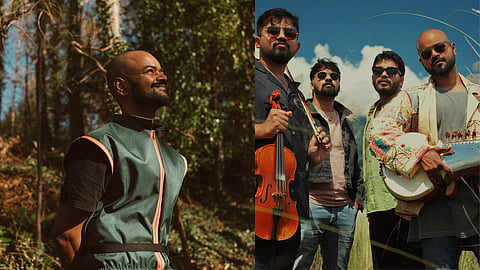
- HOMEGROWN WORLD
- #HGCREATORS
- #HGEXPLORE
- #HGVOICES
- #HGSHOP
- CAREERS
- ABOUT US
- CONTACT US

This article looks at Soumik Datta’s 'Melodies in Slow Motion', a seven-month India tour that redefined what it means to be a touring musician by turning performance into collaboration, dialogue, and social engagement. Following experimental live shows like Travellers and One Size Fits All, Datta now extends this journey through The Common Breath Residency — a three-part programme across Dharamshala, Kerala, and Delhi exploring the intersection of sound, ecology, and climate justice.
Earlier this year, London-based sarod virtuoso and composer Soumik Datta set out to reimagine what it means to be a touring musician outside the machinery of performance circuits. His seven-month India tour, 'Melodies in Slow Motion', emerged as a sustained conversation between people, places, and sounds across India’s vast musical and cultural terrain. Soumik collaborated with young musicians, recorded in unconventional locations, and performed everywhere from concert halls and festivals to homes, schools, hospitals, and youth justice centres. Through workshops with NGOs and marginalised communities, he turned music-making into an act of dialogue — one that dismantled the hierarchy between performer and audience.
As part of the tour, 'Travellers', a live show that premiered in Mumbai earlier this year, combined immersive sound design, field recordings, and performance to map the emotional terrain of migration, exile, and belonging. Woven through the score were cries of refugees, fragments of news reports, and the sound of missiles countered by sarod, violin, and percussion. In Ahmedabad, Soumik presented another version titled 'One Size Fits All', where musicians performed alongside weavers, block-printers, and katha artisans creating textiles in real time. 'Travellers' have also been showcased at Jaipur and Delhi, and will feature at the Jaigarh Heritage Festival in December.
Within the tour, comes 'The Common Breath Residency'— a three-part creative exploration of sound, ecology, and the air that connects us all. A collaboration between W.I.P Labs, Soumik Datta Arts, and Teamwork Arts, the residency brings together artists, scientists, and indigenous knowledge-keepers across Dharamshala, Kerala, and Delhi to explore the entanglement of sound and climate justice. Its guiding question asks, "How do we listen differently, more deeply, more responsibly, when the world itself is under threat?" Designed as a co-learning ecosystem, the residency invites musicians, sound designers, and climate activists to think and create together.
Phase I of The residency was held in Dharamshala in last month, focusing on mountain ecologies and the fragile air systems of the Himalayas. Daily soundwalks, field recordings, and collaborative improvisations helped participants translate environmental data and lived experience into musical form. The upcoming Phase II, will take place in Kerala (Dec 1–5), turning its attention to coastal environments and monsoon air systems — listening to how humidity, tides, and winds shape both human and natural rhythms. And Phase III, which is based Delhi (Jan 31–Feb 4), will confront the most urgent and visible air pollution crises of urban India.
Across each phase, the residency aims to encourage artists to engage in immersion, creation, and documentation — developing soundscapes, collective compositions, and new media works that respond to their environments. The process will culminate in a collaborative album, integrating field recordings and compositions born from the residencies, accompanied by a visual documentary chronicling the journey and a series of public listening sessions in each city.
Common Breath is an extention of Soumik’s mission to go beyond the concert stage — transforming sound into a tool for inquiry and empathy. By positioning air pollution not merely as an environmental problem but as a cultural and creative concern, the residency reframes how artists and audiences engage with the climate crisis. Through this project, Soumik is building a model for artistic responsibility in a warming world and using creativity to bridge the gap between art and science as well as personal practice and planetary consciousness.
Follow Soumik here.
If you enjoyed reading this here's more from Homegrown:
Madame Gandhi's Sample Pack Of Sounds From Antarctica Aims To Inspire Climate Action
Melodies of Change: How Indian Musicians Are Rallying Against Environmental Challenges
Attend A Climate Action-Driven Sound Installation By Tarun Balani In Delhi This Sunday
